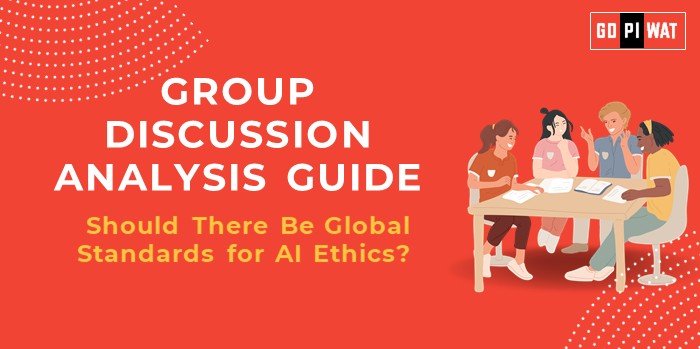📋 Group Discussion Analysis Guide
🌐 Should There Be Global Standards for AI Ethics?
🧠 Introduction
Artificial Intelligence (AI) has become a transformative force across industries, shaping global economies and societies. However, its rapid growth has also introduced ethical challenges such as algorithmic bias, data privacy issues, and misuse, spurring calls for unified global standards for AI ethics to ensure responsible development and deployment.
📊 Quick Facts & Key Statistics
- Global AI Revenue (2024): The AI market is expected to generate $214 billion in 2024, with projections reaching $1,339 billion by 2030, highlighting its economic significance.
- Bias in AI: AI systems have demonstrated discriminatory biases, disproportionately impacting marginalized groups and underscoring the need for ethical frameworks.
- Data Privacy Concerns: Increased AI integration across sectors has amplified privacy risks, necessitating robust ethical standards to safeguard individual rights.
- UN’s AI for Good Program: Established in 2017, the initiative seeks to advance sustainable development goals through the ethical use of AI.
👥 Stakeholders and Their Roles
- Governments: Develop national AI policies and contribute to international standards (e.g., EU AI Act).
- Corporations: Innovate responsibly and adopt ethical AI practices (e.g., Google, IBM).
- Global Organizations: Lead collaborative efforts (e.g., the UN’s AI for Good initiative).
- Academia: Research bias mitigation and ethics in AI development.
- Civil Society: Advocate for transparency and equity in AI policies.
🏆 Achievements and Challenges
- Achievements:
- The EU AI Act represents a pioneering effort in AI regulation, emphasizing fairness and accountability.
- The UN’s AI for Good Program promotes global cooperation in leveraging AI for sustainable development.
- Corporate initiatives like Microsoft’s ethical AI principles set benchmarks for responsible innovation.
- Challenges:
- Cultural and Political Divergence: Differing priorities hinder consensus on global standards.
- Enforcement Gaps: No centralized body exists to monitor adherence to these standards.
- Technological Bias: Persistent discrimination against marginalized communities due to algorithmic flaws.
📖 Case Studies
- Facial Recognition Misuse: Highlighted in Hong Kong protests, raising concerns over surveillance ethics.
- Algorithmic Bias in Hiring Tools: Amazon’s AI system penalized female candidates, demonstrating AI’s potential for harm.
🗣️ Effective Discussion Approaches
- Opening Approaches:
- Statistical Insight: “The AI market’s projected growth from $214 billion to $1,339 billion by 2030 demonstrates its global impact, making ethical regulation essential.”
- Contrast: “While AI accelerates innovation, its unchecked use has led to discriminatory biases and data privacy violations.”
- Counter-Argument Handling:
- Claim: “Global standards may stifle innovation.”
- Rebuttal: “Ethical standards enhance trust, which drives sustainable innovation and adoption.”
🔍 Strategic Analysis of Strengths & Weaknesses
- Strengths: Enhances trust, ensures fairness, promotes global collaboration.
- Weaknesses: Implementation complexity, resistance from powerful nations.
- Opportunities: Supports sustainable growth, aligns with global development goals.
- Threats: Risk of technological misuse, unequal adoption across regions.
🛠️ Structured Arguments for Discussion
- Supporting Stance: “Global AI standards can minimize bias and promote equitable benefits, fostering trust and accountability.”
- Opposing Stance: “Imposing global standards risks limiting innovation and may not accommodate regional diversity.”
- Balanced Perspective: “While global standards set ethical baselines, flexibility for local adaptations is crucial.”
📚 Connecting with B-School Applications
- Real-World Applications: B-school projects can explore AI ethics in sectors like finance, healthcare, or policy-making.
- Sample Interview Questions:
- “How do global standards ensure ethical AI deployment?”
- “What are the challenges of implementing AI ethics across diverse regions?”
- Insights for Students:
- Examine global case studies and explore ethical AI’s role in driving corporate and social responsibility.


